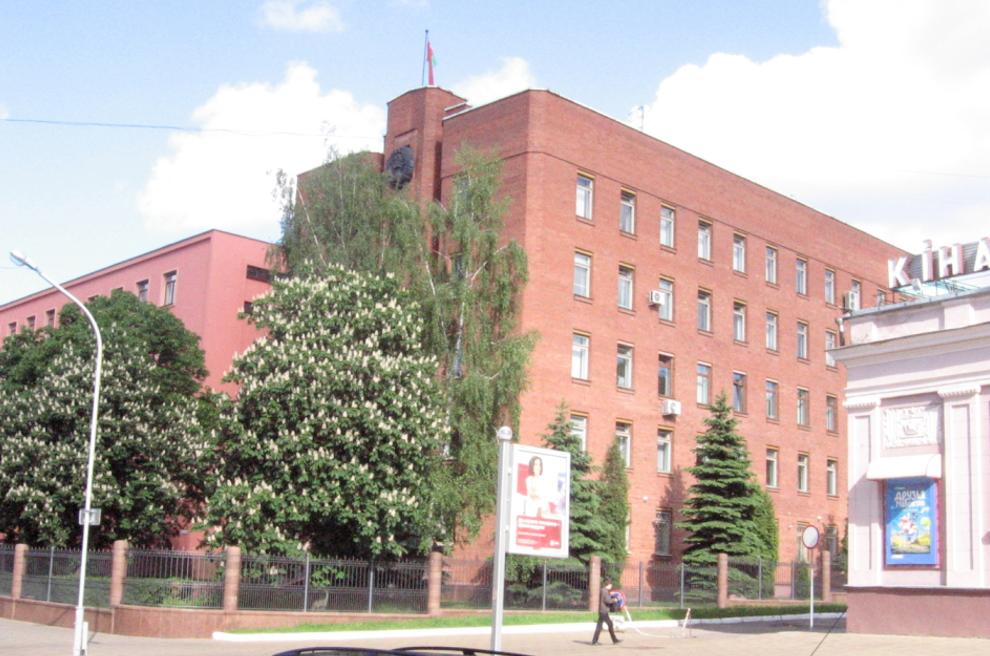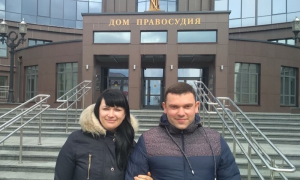In December 2021, the United Nations Human Rights Committee asked Belarus to respond in the case of 33-year-old Jehovah’s Witness conscientious objector Dmitry Mozol. In February 2021, a court in Pinsk fined him four months’ wages for refusing call-up to reservist military training on grounds of conscience. He failed to overturn the criminal punishment on appeal. The law allows only individuals who have completed alternative civilian service to be exempted from reservist military training. Alternative service was introduced only in 2016, after Mozol was initially called up. Jehovah’s Witnesses fear that other young men could also face such prosecution.

Dmitry Mozol lodged a petition to the United Nations Human Rights Committee in November 2021 after being fined for refusing to undergo nearly four weeks of reservist military training on grounds of conscience. A court in Pinsk fined the 33-year-old Jehovah’s Witness four months’ wages in February 2021, a criminal punishment he failed to overturn on appeal. The UN Committee asked the Belarus regime questions about the case on 22 December 2021.
Jehovah’s Witness Mozol was among those who had not performed alternative civilian service, as it was introduced only in July 2016. Others had done military service before joining the religious community. Mozol is the only young man known to have been prosecuted and punished for refusing reservist military training on grounds of conscience (see below).
Pinsk Inter-District Prosecutor’s Office refused to put Forum 18 through to Aleksei Borchuk, who brought the criminal case against Mozol to court (see below).
Aleksandr Gerasimenko of Pinsk Military Conscription Office, who testified against Mozol in court in February 2021, defended the prosecution. “Alternative service did not extend to Dmitry Nikolayevich,” he told Forum 18 from Pinsk on 11 January 2022. “He was sentenced in accordance with the law” (see below).
Deputy Chief of the Armed Forces Major General Aleksandr Shkirenko rejected Mozol’s appeal against his call-up for reservist military training in June 2019. The duty officer at the Main Organisation and Mobilisation Office told Forum 18 from Minsk on 11 January 2022 that Major General Shkirenko was not in the office.
Asked about Mozol’s case and why an individual who has not done either military or alternative service cannot be exempted from call-up to reservist military training on grounds of conscience, the duty officer declared: “The person must apply to the local Military Conscription Office. We don’t talk to the press” (see below).
Jehovah’s Witnesses fear that other young men could also face such prosecution. They point out that under the 1992 Military Obligation and Military Service Law, only persons who have completed alternative civilian service are exempted from military reservist training (see below).
“The authorities interpret the law very narrowly and claim that those who previously performed military service do not have the right to conscientious exemption from reservist training,” Jehovah’s Witnesses note. “This interpretation of the law endangers the rights of believers who previously performed military service but cannot now in good conscience do so. Potentially, these men can become subject to criminal prosecution.” Similarly, those like Mozol who were never called to military service face potential prosecution if summoned for reservist military training.
Jehovah’s Witnesses are conscientious objectors to military service and do not undertake any kind of activity supporting any country’s military. But they are willing to undertake an alternative, totally civilian form of service, as is the right of all conscientious objectors to military service under international human rights law.
Alternative civilian service since July 2016
All young men are subject to 18 months’ military service (12 months for those with higher education) between the ages of 18 and 27. For many years, the regime punished young men who refused military service on grounds of conscience with jail or fines. Those prosecuted included Jehovah’s Witness Dmitry Smyk, Messianic Jew Ivan Mikhailov, non-religious pacifist Yevhen Yakovenko, and non-religious pacifist Andrei Chernousov.
Belarus’ first-ever Alternative Service Law took effect from 1 July 2016. It allows some, but not all, young men who are conscientious objectors to perform a civilian alternative service instead of compulsory military service.
Only young men with a religious pacifist objection are eligible to apply for alternative civilian service, not those with non-religious pacifist convictions. It is unclear whether even all young men with religious objections to military service are allowed to do civilian alternative service, as the Law is silent on how objectors from communities which are not as a community formally pacifist – such as the Orthodox Church – are to be treated.
Moreover, civilian service is twice the length of military service (36 months generally, or 24 months for those with higher education) and those undertaking it are paid less than military conscripts. And if conscripts already doing military service or those who have completed military service change their beliefs to become conscientious objectors, they are not eligible for alternative service.
The last young man known to have been punished for refusing regular military service on grounds of conscience was Jehovah’s Witness Viktor Kalina. A court in the western city of Brest fined him the equivalent of 100 days’ average local wages in May 2016. He failed to overturn the fine on appeal.
Jehovah’s Witnesses say their young men have been able to undertake alternative service since 2016 without obstruction.
Human rights defenders told Forum 18 that they are not aware of other conscientious objectors called up to military service or reservist military training who were prevented from undertaking alternative civilian service.
Reservist military training
Young men are subject to conscription between the ages of 18 and 27. After that age, the 1992 Military Obligation and Military Service Law specifies that they can be subject to compulsory annual reservist military training. Under Article 70, those who have performed alternative service are exempt from such reservist military service.
However, conscientious objectors – like Mozol – who expressed a willingness to do an alternative civilian service before it existed and who were never summoned for military service are not exempted from compulsory annual reservist military training. Nor are those who adopted a conscientious objection after having conducted compulsory military service.
Repeatedly called up
The Military Conscription Office in Pinsk repeatedly called up Dmitry Nikolayevich Mozol (born 1 December 1988) for compulsory military service in the early 2010s. Among several such letters, on 24 September 2013, he wrote to set out his objection to serving in the military on grounds of conscience and to request a civilian alternative service instead of military service. He was initially granted deferment because of his studies.
The Military Conscription Office never called Mozol for military service. As no alternative civilian service was available then, he completed no alternative service.
However, only in 2019 did Mozol learn that the Military Conscription Office had, without informing him, classified him in 2015 as “unfit for health reasons”. This meant he was exempt from call-up for military or alternative service.
Also without his knowledge or consent, on reaching the age of 27 in December 2015, the military had enrolled Mozol in the military reserves. This made him eligible for reservist military training.
On 18 February 2019, the military summoned Mozol for compulsory military training. On 26 February 2019, Mozol wrote to the Pinsk Military Conscription Office setting out his objection to serving in the military on grounds of conscience as a Jehovah’s Witness and asking for exemption.
On 4 March 2019, the Pinsk Military Conscription Office responded to Mozol. It stated that under Article 3 of the Alternative Service Law, those being summoned for military service can be assigned to an alternative service. “Because you are not liable for compulsory military service and have not performed alternative service, this Article of the Law does not apply to you.”
Mozol complained to Brest Region Military Conscription Office, but on 12 April 2019 it rejected his appeal. It argued that “military duty” is performed “regardless of .. attitude to religion” and that Mozol “cannot be summoned for alternative service”.
On 18 June 2019, the Main Organisation and Mobilisation Office of the Armed Forces’ General Staff in Minsk rejected Mozol’s appeal. “The fact that you profess the religion of Jehovah’s Witnesses is not a valid reason for making a decision to exempt you from performing military training,” Deputy Chief of the Armed Forces Major General Aleksandr Shkirenko wrote to Mozol in a letter seen by Forum 18.
The duty officer at the Main Organisation and Mobilisation Office told Forum 18 on 11 January 2022 that Major General Shkirenko was not in the office. Asked about Mozol’s case, the duty officer responded: “We don’t give consultations.” Asked why an individual who has not done either military or alternative service cannot be exempted from call-up to reservist military training on grounds of conscience, the duty officer declared: “The person must apply to the local Military Conscription Office. We don’t talk to the press.”
Court challenge
On 15 July 2019, Mozol challenged the rejection of his request for exemption from military training at Pinsk District and City Court. He cited case law from the UN Human Rights Committee and the European Court of Human Rights in Strasbourg setting out the human right to freedom of religion or belief, including the right not to perform military service on grounds of conscience.
Although the Defence Ministry rejected Mozol’s complaint, Pinsk District and City Court ruled in his favour on 27 August 2019.
However, the Prosecutor appealed against this decision. On 28 October 2019, Brest Regional Court upheld the Prosecutor’s case and overturned the lower court decision.
The Supreme Court rejected Mozol’s supervisory appeal on 6 April 2020 in a decision seen by Forum 18. It insisted that “no documents were submitted that confirm valid reasons to exempt you from military training. The certificate you provided, which indicates that you profess the religion of Jehovah’s Witnesses, does not of itself give indisputably valid reasons.”
Renewed summons for military training
On 8 October 2020, Mozol received a summons to report for military training. Four days later, the military informed his employer that Mozol had been summoned for military training from 3 to 27 November 2020.
On 13 October 2020, Mozol again outlined his conscientious objection to military training in person at Pinsk Military Conscription Office. Officials rejected his request for exemption and instructed him to present himself for training on 3 November. The Conscription Office told him he was being assigned to a unit where those with conscientious objections to handling weapons service in a non-combat role.
On 3 November 2020 Mozol went to Pinsk Military Conscription Office but refused to be transported to the military unit to which he had been assigned. He again explained in writing his objections to serving on conscientious grounds.
Criminal conviction, fine
On 17 December 2020, Pinsk Inter-District branch of the Investigative Committee launched a case against Mozol under Criminal Code Article 436, Part 1. This punishes a reservist or someone due for duty who fails to report for such duty with community work, a fine, up to one year’s correctional labour or imprisonment of between one and three months.
Mozol was required to sign a pledge not to leave the area and to maintain good conduct.
On 18 February 2021, Judge Olga Lubnik at Pinsk District and City Court found Mozol guilty. “His personal conviction is based on [his] study of the Bible, and this affects his attitude towards military service,” the verdict – seen by Forum 18 – noted. “According to the certificate of the Religious Association of Jehovah’s Witnesses, each believer makes his own decision regarding military or alternative service based on his religious beliefs, which also confirms that there is no direct prohibition concerning [military] service.”
Judge Lubnik fined Mozol 100 base units, 2,900 Belarusian Roubles. This represents about four months’ of his earnings, Jehovah’s Witnesses told Forum 18. The Judge also ordered the seizure of Mozol’s mobile phone “to ensure that the verdict is implemented”.
Aleksandr Gerasimenko of Pinsk Military Conscription Office, who testified against Mozol in court in February 2021, defended the prosecution. “Alternative service did not extend to Dmitry Nikolayevich,” he told Forum 18 from Pinsk on 11 January 2022. “He was sentenced in accordance with the law.”
Asked why an individual who had not been able to undertake alternative civilian service because it had not been available at the time should be punished for refusing call-up to reservist military training when he was prepared to do an alternative, Gerasimenko insisted that this is the law.
Aleksei Borchuk of Pinsk Inter-District Prosecutor’s Office brought the criminal case against Mozol to court and was present at the trial. The Prosecutor’s Office refused to put Forum 18 through to Borchuk. “We don’t put people through or give out phone numbers,” the official who answered the phone on 11 January 2022 told Forum 18. “Those are our instructions.”
Mozol lodged an appeal to Brest Regional Court on 1 March 2021. However, on 6 April 2021, a panel of three Judges at the Regional Court, headed by Judge Nina Shestak, dismissed the appeal, according to the decision seen by Forum 18.
Once the Regional Court dismissed the appeal, the verdict came into force. Although he disagreed with the punishment, Mozol paid the fine, Jehovah’s Witnesses told Forum 18.
Request for Constitutional Court review
On 6 April 2021, Mozol also lodged a motion via Brest Regional Court to the Constitutional Court in Minsk. He described it as “absurd and discriminatory on the basis of age” that those who were too old to be able to perform alternative civilian service can be required to do reservist military training.
Mozol also noted that the Law allows those who have done alternative civilian service to change their views and later undertake military service. At the same time, the Law does not allow those who have undertaken military service to change their views and request on grounds of conscience an alternative to subsequent call-up to military duties.
The motion, seen by Forum 18, asks the Constitutional Court to establish the existence of a gap in the law on military service with regard to the lack of the constitutional right of citizens who have not completed alternative service for objective reasons to be exempted from military training on the grounds of their religious beliefs.
On 20 October 2021, the Constitutional Court ruled that there were “no grounds” for proceeding with the motion, Jehovah’s Witnesses told Forum 18.
UN Human Rights Committee complaint
Mozol then decided to lodge a complaint to the United Nations Human Rights Committee, which examines complaints of violations of human rights under the International Covenant on Civil and Political Rights (ICCPR).
Mozol’s complaint, lodged on 10 November 2021 and seen by Forum 18, asked the Committee for a finding that Belarus had violated the Article 18 (“Freedom of thought, conscience and religion”) of the ICCPR “by issuing summons to the complainant to participate in a military training, rejecting his request to be exempted from it, initiating a criminal case, issuing a guilty verdict, fining him and arresting his property”.
In its 22 December 2021 response, seen by Forum 18, the Human Rights Committee noted that the complaint had that day been sent to the Belarusian government with a request for its response. (END)



